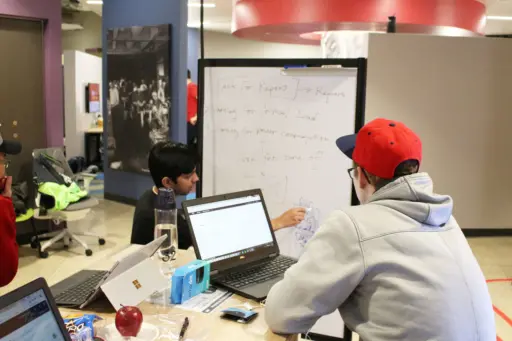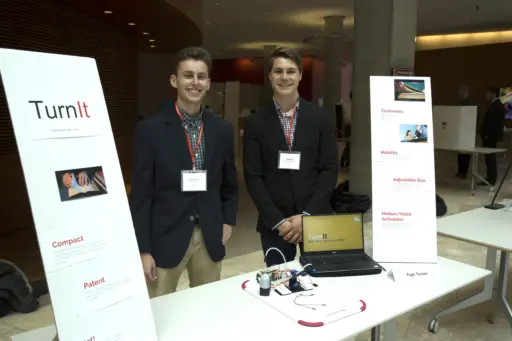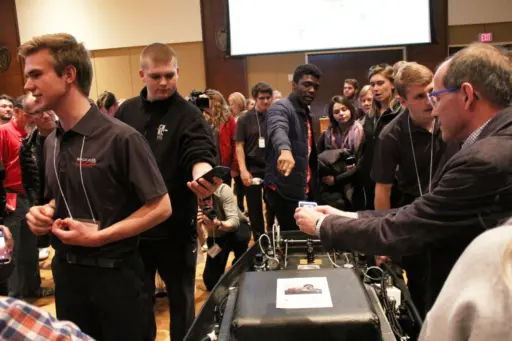Apple, Google, Amazon, Harley Davidson, Hewlett Packard, and Disney are all top-grossing companies that famously got their start in somebody’s garage.
Today, however, young entrepreneurs are building their world-changing ideas on college campuses like the University of Wisconsin-Madison.
Innovation flourishes at UW-Madison thanks to a climate that encourages collaboration with people from diverse backgrounds and provides a wealth of top-notch resources for getting creative juices flowing.
One of those is the recently opened College of Engineering makerspace.
Drop into the makerspace on any given night, and you’ll likely see clusters of students soldering circuit boards, tinkering with a laser cutter, or feeding coordinates into one of the facility’s many 3D printers. The space is open and staffed for 70 hours per week, giving Badger engineering students and their collaborators ample opportunities to work on their projects.
 Graduate student Ashray Manur helps a hackathon participant work through some tricky coding in the makerspace.
Graduate student Ashray Manur helps a hackathon participant work through some tricky coding in the makerspace.
One group that makes frequent visits to the makerspace is Insight Wisconsin, a student organization devoted to bringing people together to work on real-world product designs. Since its inception in January 2016, the organization has ushered more than 16 student design teams through the process of brainstorming, design-review, and product presentation for client-based and research-based projects.
“Our brand is a small-scale design ‘company’ for students to have the structure and deadlines to push them through finishing a project,” says Gopika Senthilkumar, a biomedical engineering undergraduate who co-founded Insight Wisconsin during her freshman year in 2016.
Some of the products that Insight Wisconsin teams created include low-cost solar lamps that have provided light for communities in Kenya and a device called a clinostat that creates a microgravity environment to enable scientists to study plant growth in outer-space-like conditions without leaving Earth.
Insight Wisconsin also helped host the makerspace’s first makeathon in 2017, a sprint-like event where people work intensively for several days to create potentially marketable products. Since then, several makeathons and hackathons have taken place in the space.
“Having the makerspace was so important,” says Giri Venkataramanan, a professor of electrical and computer engineering who co-organized EnerHack 2018, Madison’s first hackathon focused on sustainable energy. “We needed a place where the students could work all weekend and be able to rapid-prototype.”
At EnerHack 2018, participants created everything from a digital assistant for home power grids using the Amazon EchoDot to apps that identify the most efficient, cost-effective locations to install solar panels.
Although the hackathon was organized as a competition—with $1,000 prizes going to the teams behind the most innovative products and the concepts with the greatest potential social impact—even the students who didn’t walk away with cash took something valuable from the event.
“I love hackathons because you always learn something,” says Namrata Kogalur, a graduate student in electrical and computer engineering who helped create a betting marketplace app with challenges designed to encourage more sustainable energy use.
 Seth Eisman and Kevin Kirk, who created an automatic page turning device to help people with disabilities read books, took home the social entrepreneurship award at the 2018 Transcend Innovation Competition.
Seth Eisman and Kevin Kirk, who created an automatic page turning device to help people with disabilities read books, took home the social entrepreneurship award at the 2018 Transcend Innovation Competition.
Sometimes, fledgling companies emerge from the makerspace once the dust settles from a weekend of nonstop hacking. After placing third in the 2017 Madison Makeathon for their prototype of a hands-free page-turning device designed as an aid for people with disabilities, Seth Eiseman, Kevin Kirk and Ben Gabbard developed their concept into a product called TurnIt.
TurnIt went on to win a $1,000 early-stage prize for social entrepreneurship at the 2018 Transcend Madison Innovation Competition—an annual student-led contest through the organization Transcend Engineering.
Between 2017 and 2018, the TurnIt team refined its device through multiple rounds of prototyping to improve reliability for its small suction cup and mechanical arm. Team members also identified other potential markets for their product, including musicians and cooks.
“I feel like I’ve learned a lot about starting something from scratch and being able to create a new product,” says Gabbard, a mechanical engineering sophomore.
Along the way, the team participated in several networking events and workshops organized by Transcend Engineering, which is a student community aimed at encouraging entrepreneurship.
“This is a great place for a student who maybe wants to start their own business, or who wants to work with a team to start their own venture, or people who just want to check out what other people are doing,” says Xiaojun He, a senior majoring in computer engineering and computer science and Transcend Engineering’s graphic designer. “I think it’s a fantastic place for engineering students, science students, liberal arts students—it’s a very open space.”
He co-founded Kilter, a mobile app that allows users to earn rewards for going to the gym, with Seth Braddock, a life sciences communication and biology major. The business partners met through their participation in Transcend Engineering.
Working on projects together often helps build life-long friendships.
 Students competing in the SpaceX hyperloop competition to create an ultrafast futuristic form of transportation explain the electronics system of the pod they designed and created.
Students competing in the SpaceX hyperloop competition to create an ultrafast futuristic form of transportation explain the electronics system of the pod they designed and created.
“It helps make this campus feel like more of a community,” says Senthilkumar. “I never would have imagined that I’d have friends from botany, business, and the School of Human Ecology.”
Those diverse friendships underscore the importance of incorporating multiple perspectives into an endeavor.
“When people with different backgrounds get together and start asking, “‘What if?'” said Ian Robertson, Grainger Dean of the College of Engineering, at the 2018 Transcend Innovation Competition closing ceremony. “That’s when imaginations kick into high gear and really innovative ideas start to emerge.”
One group with imaginations on overdrive is Badgerloop, a primarily undergraduate team that has been asking, “What if Hyperloop is the future of public transportation?”
Hyperloop is an ultrafast, futuristic form of transportation where people travel in pods through airless tubes at almost half the speed of sound. The concept is gaining traction thanks, in part, to SpaceX CEO Elon Musk’s sponsorship of a yearly contest to create the best pod design. In the competition’s first two years, 2016 and 2017, innovation awards went to team Badgerloop from UW-Madison.
Team Badgerloop consists of more than 50 students from departments all across campus who work together to shape carbon-fiber components for the pod’s chassis, install a custom-designed mechanical wheel for propulsion, wire navigation and braking systems, raise funds, communicate with partners, and more.
“The nature of the project is pretty demanding,” says propulsion team lead Mark Swartz, a senior majoring in mechanical engineering.
Overcoming challenges is one thing that Badgers do best. UW-Madison encourages its students to seek out and learn from challenges, whether through extracurriculars, research or entrepreneurial endeavors.
As Lori Berquam, UW-Madison vice provost for student life and dean of students said in remarks at the 2018 Transcend Innovation Competition closing ceremony: “What you’ve done is embraced and embarked on your own Wisconsin experience.”
And one person’s Wisconsin experience today might help make tomorrow’s world a better place.